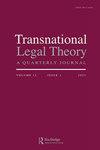Earth system law for the Anthropocene: rethinking environmental law alongside the Earth system metaphor
Q2 Social Sciences
引用次数: 24
Abstract
ABSTRACT Despite its noble intentions and some victories, environmental law has been and continues to be complicit in driving the processes and paradigms that give rise to the Anthropocene. Environmental law is also unable to respond to the regulatory challenges that arise from the Anthropocene's complex Earth system. We need a new legal paradigm that is better fit for purpose in the Anthropocene called Earth system law. A key reason for environmental law's failures and an obstacle preventing its transformation, is its reluctance to embrace and respond to the notion of the Earth system. My hypothesis is that the Earth system metaphor should be key in rethinking environmental law with the ultimate view to constructing Earth system law for the Anthropocene. The primary purpose of this paper is to explore what the Earth system metaphor entails and what it might imply for environmental law's transformation to Earth system law.人类世的地球系统法律:与地球系统隐喻一起重新思考环境法
尽管有崇高的意图和一些胜利,环境法一直并将继续在推动产生人类世的过程和范式方面发挥同谋作用。环境法也无法应对人类世复杂的地球系统所带来的监管挑战。我们需要一种新的法律范式,它更适合人类世的目的,即地球系统法。环境法失败的一个关键原因和阻碍其转变的一个障碍,是它不愿意接受和回应地球系统的概念。我的假设是,地球系统隐喻应该是重新思考环境法的关键,并最终以构建人类世的地球系统法律为目标。本文的主要目的是探讨地球系统隐喻意味着什么,以及它对环境法向地球系统法的转变可能意味着什么。
本文章由计算机程序翻译,如有差异,请以英文原文为准。
求助全文
约1分钟内获得全文
求助全文
来源期刊

Transnational Legal Theory
Social Sciences-Law
CiteScore
2.10
自引率
0.00%
发文量
7
期刊介绍:
The objective of Transnational Legal Theory is to publish high-quality theoretical scholarship that addresses transnational dimensions of law and legal dimensions of transnational fields and activity. Central to Transnational Legal Theory''s mandate is publication of work that explores whether and how transnational contexts, forces and ideations affect debates within existing traditions or schools of legal thought. Similarly, the journal aspires to encourage scholars debating general theories about law to consider the relevance of transnational contexts and dimensions for their work. With respect to particular jurisprudence, the journal welcomes not only submissions that involve theoretical explorations of fields commonly constructed as transnational in nature (such as commercial law, maritime law, or cyberlaw) but also explorations of transnational aspects of fields less commonly understood in this way (for example, criminal law, family law, company law, tort law, evidence law, and so on). Submissions of work exploring process-oriented approaches to law as transnational (from transjurisdictional litigation to delocalized arbitration to multi-level governance) are also encouraged. Equally central to Transnational Legal Theory''s mandate is theoretical work that explores fresh (or revived) understandings of international law and comparative law ''beyond the state'' (and the interstate). The journal has a special interest in submissions that explore the interfaces, intersections, and mutual embeddedness of public international law, private international law, and comparative law, notably in terms of whether such inter-relationships are reshaping these sub-disciplines in directions that are, in important respects, transnational in nature.
 求助内容:
求助内容: 应助结果提醒方式:
应助结果提醒方式:


